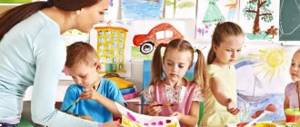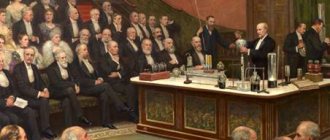Lesson summary on ODNKNR in 5th grade. Topic: “Life is full of military feats.”
ODNKNR. 5th grade.
Topic: “Life is full of military feats”
Lesson type:
expansion of existing and “discovery” of new knowledge.
Target:
formation and development of students’ value attitude towards joint educational and cognitive activities when analyzing the concepts of “feat of arms”, “hero”, “feat”.
Tasks:
Educational:
deepen knowledge about the concepts of “feat of arms”, “hero”;
Educational:
develop cognitive interest, horizons, interest in reading historical literature; develop control and self-control skills, skills of practical work in groups; develop cognitive activity, the ability to observe, compare, generalize and draw conclusions.
Educational:
promote the formation of positive personal qualities of students, support the needs and motives to learn “new things”; deepen the disclosure of moral categories: responsibility, service, love for the Fatherland; to form an emotionally positive attitude towards the subject, showing its direct connection with life.
Planned results:
Personal: to form a holistic, socially oriented view of the world in its organic unity; to form motivation for learning and purposeful cognitive activity; work in a group; contribute to the work to achieve common results; be tolerant of other people’s and own mistakes, other opinions and be willing to discuss them.
Regulatory: discover and formulate an educational problem; after preliminary discussion, independently formulate the topic of the lesson and the purpose of the lesson; predict upcoming work: determining the purpose of educational activities, choosing a topic; evaluate learning activities in accordance with the task; learn to evaluate the results of educational activities; make adjustments to your activities.
Cognitive: navigate your knowledge system; extract and process information to discover new knowledge; extract information presented in different forms (text, audio file, illustration); process the information received: draw conclusions as a result of joint work.
Communicative: express your point of view and try to substantiate it by giving arguments; express your thoughts in speech and convey your position to others;
learn to listen to another point of view, be ready to change your own; jointly agree on the rules of communication and behavior in the group and follow them; consciously choose a criterion for qualitative assessment of the group’s work.
Subject: be able to explain the meaning of the terms “feat of arms”, “hero”, “believer”, “blessing”, etc.; expand knowledge about Russian holy princes - defenders of the Fatherland.
During the classes
1. Organizational moment.
2. Updating knowledge.
Psychological mood - the sound of a bell ringing.
There is hardly a person on earth who has not heard the singing of bells.
Have you ever heard a bell ringing before? Where and under what circumstances?
Student answers.
We are all different: in age, in culture, in religion, and even in citizenship. But now we are in the Russian Federation. For some of you this is the Motherland; some of you ended up here by chance. And yet, we all should know about the traditions and culture of the Russian people, about the exploits of its sons and daughters, its history...
It is impossible to imagine Russia without churches and the ringing of bells. These are symbols of Russia, its integral part. The bells rang both on great holidays - bells, and on difficult moments of trials - alarms, which warned people of impending danger. With the ringing of bells they saw off and greeted their warrior heroes who defended their native lands from enemy attacks.
And our land has long been rich in heroes. I draw your attention to the screen:
Dmitry Donskoy, Alexander Nevsky, Kuzma Minin and Dmitry Pozharsky.
What do you think all these people have in common and what made them famous?
(Answers. Previously, the films “Alexander Nevsky”, “1612”, “The Tale of a Real Man” were watched outside of class hours)
3. Goal setting.
Open the textbooks on p. 25 read the topic of our lesson.
Ø How do you understand the theme of the lesson “Life is full of military feats”?
Ø What is the purpose of our lesson?
(students’ answers determine the purpose of the lesson)
Yes, today I will try to discover something new for each of you, and you will learn something new for yourself, about feats of arms and warrior-defenders.
Let's turn to the explanatory dictionary and dictionary of synonyms. Find the meaning of the words “feat”, “army”, “military” and select synonyms for these words:
(work with dictionaries, answer).
At different historical periods, Russia was attacked by enemies. In these difficult times, Russia gave birth to many heroes, whose memory the people have preserved for centuries.
-Who is a hero? What qualities should a hero have?
(Possible answers: brave, fearless, kind, brave, selfless, smart, strong, courageous)
Problematic question:
We remembered historical figures whose military exploits glorified them for centuries.
— Is there a place for feat of arms in modern life?
Pay attention to the newspapers that are on the desks. Find in them examples of those actions of people that can be called feats of arms.
- So you and I have proven that in our time there IS a place for feats of arms!
4. Work on new material.
Let's go back hundreds of years again, to the history of Russia. The holy Russian land raised many heroes. Using the example of the life of Saint Prince Dmitry Donskoy, I suggest you expand your knowledge about the feat of arms. When warriors went to fight the enemy for a just cause, in Rus' they were always blessed before the campaign or battle.
— Let us turn to the meaning of the word “blessed.” How do you understand its meaning? (students' answers).
- Now find this word in explanatory dictionaries, read its meaning. Now you understand what role the WORD played!
— Let’s open the textbooks and work on the text “The Blessing of Sergius of Radonezh.” Let's read it and look at the illustrations.
— Who did Dmitry Donskoy ask for a blessing for the battle with the Horde troops?
-Confirm the following thoughts with text or your own judgments: “In the struggle for the freedom of his Fatherland, Dmitry Donskoy was strengthened by faith in God.”
4. Work in pairs.
Now you will work independently with the textbook. I have 8 cards, cut in half. You will find your match by spelling the word correctly. And after folding the card, read the task. And on the screen you will see a general task: read the text, give a reasoned answer to the questions for discussion.
1 pair: the word “hero”.
With. 28-31 — “Nadezhda Durova”, “Bashkir cavalrymen in the war of 1812”, “Rabbi Shneur-Zalman”
2nd pair: the word “defender”.
With. 31-32 “Every courageous man brings glory to his homeland” about Alexei Maresyev
3rd pair: the word “feat”
With. 32-33, "Alexander Ivanovich Pokryshkin".
4 pair: the word “homeland”
With. 34-35 “Participation of Kalmyks in the Great Patriotic War”, “Contribution of Muslim peoples to the Great Victory” (patriotic songs from different years are played during students’ work)
Finish your work. We listen carefully to your reports. (pairs report on the work done, evaluate the work of other pairs)
6. Checking the mastery of the material.
— What moral qualities of a person did we talk about today in class?
— What contribution did people of different nations and different religions make to the victory over the enemy?
- Why didn’t they remain indifferent to the events taking place?
— What supported people during difficult times for their country?
Working with proverbs.
There are many proverbs about heroism and feats of arms. I propose to take part in the game: complete the proverbs of the peoples of Russia (knowledge of a just war, its goals, and the criteria of heroism is tested):
1) We don’t want war, but we are ready for war (ready)
2) The sage is drawn to goodness and peace, the (fool) is drawn to war and strife.
3) Clouds cannot cover the sun, war cannot (win) the world
4) The enemy of my people is mine (enemy)
5) He fell by the death of a hero, but did not (sell) his homeland
6) Hero - for the Motherland (mountain)
7) Whoever takes up the sword will die by the sword (and die)
 He who fights hard for the truth is a real (hero)
He who fights hard for the truth is a real (hero)
7. Summing up. Reflection. Assessing student work.
· Was the lesson useful to you?
· Have we been able to prove that “life is full of military feats”?
· What more would you like to know about this topic?
8. Homework:
Prepare a message about the heroes of your homeland, nationality, family.
Form: presentation, report, essay, etc.


